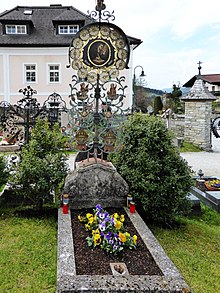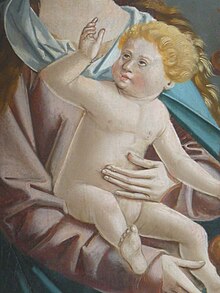Joseph Mohr
Joseph Franz Mohr (born December 11, 1792 in Salzburg , Prince Archbishopric of Salzburg , Holy Roman Empire ; † December 4, 1848 in Wagrain , Salzburgkreis , Austrian Empire ) was an Austrian priest and poet whose lyrics to the Christmas carol Silent Night, Holy Night worldwide Gained fame.
Life
Joseph Mohr was born as one of several illegitimate children of the musketeer Franz Mohr from Mariapfarr and Mrs. Anna Schoiber from Salzburg , whom he later married, in the poor house of the Archdiocese of Salzburg , Kaigasse 9 (today Hotel Weisse Taube ). He grew up with his mother in the house at Steingasse No. 31. With the financial support of the Salzburg Cathedral Vicar Johann Nepomuk Hiernle, who valued Mohr's musical talent, he was able to attend the Academic Gymnasium in Salzburg and from 1808 to 1810 the Stiftsgymnasium Kremsmünster in Upper Austria , and finally from 1811 to study theology in Salzburg . Because of his status as an “illegitimate child”, Mohr needed a special permit for admission to the priestly ordination - this was granted to him by Pope Pius VII and Mohr was ordained a priest on August 21, 1815 by Passau Auxiliary Bishop Karl Kajetan .
Following his ordination, Mohr first worked for almost a month and a half in Ramsau near Berchtesgaden , and from October 1815 to summer 1817 in Mariapfarr , his father's home parish, as coadjutor . In September 1817 Mohr came to Oberndorf near Salzburg to support the parish provisional Josef Kessler. At the beginning of October 1817 Kessler's successor, Georg Heinrich Joseph Nöstler, complained to the consistory in Salzburg about Mohr. On October 2, 1818, Nöstler accused him of lacking “wise thought, obvious diligence” in pastoral care and studies, that he had no “particular joy in going to school and visiting the sick”, and finally, “finally the very impeccable one priestly conduct ”is deficient and he lacks the“ necessary spirit of subordination ”. Later still joking, "also with people of the opposite sex", as well as singing "often not uplifting songs". The consistory then asked for a report, which the dean and pastor of Sankt Georgen wrote. In this, Nöstler's allegations are refuted, and Mohr was able to stay in Oberndorf.
In September 1819 Mohr left Oberndorf. Further stations were the Salzburg communities Kuchl (coadjutor, 1819/20), Golling (coadjutor, 1820/21), Vigaun (coadjutor, 1821/22), Anthering (coadjutor, 1822-1824), Koppl (temporary assistant as vicarious provisional officer, 1823 / 24), Eugendorf (coadjutor, 1824–1827), Hof (vicariate provisional, 1827) and Hintersee (1827–1837). From 1837 he worked as a vicar in the Wagrain Vicariate . Mohr, who had suffered from a lung disease since his childhood due to the cold and damp Salzburg apartment, died of paralysis on December 4, 1848 in Wagrain and found his final resting place at the local cemetery.
Act
In 1818 Joseph Mohr asked the teacher Franz Xaver Gruber to compose a suitable melody for his poem "Silent Night, Holy Night", which he had written in Mariapfarr as early as 1816. During the Christmas mass on December 24, 1818 the Christmas carol Silent Night, Holy Night by Franz Xaver Gruber (vocals) and Joseph Mohr (vocals, guitar accompaniment) in the Sankt-Nikola-Kirche in Österreichisch-Laufen (= Oberndorf ). After that, the song gained worldwide fame.
While Mohr had already triggered different reactions in Oberndorf with his social commitment, in Wagrain he found more than 10 years time to leave positive traces. He arranged for a new school to be built where there was previously only one classroom for more than 100 children, founded a compensation fund to enable children of poor parents to attend school (for a fee), sponsored the fire brigade, established a church choir and looked after the elderly and poor . The poor and old people's home that was created later also goes back to his initiative. As a reminder of his social work, the Wagrain Children's Choir sings at his grave every Christmas.
Posthumous honors
Joseph Mohr was not portrayed during his lifetime. In 1912, therefore, at the instigation of the academic sculptor and pastor Josef Mühlbacher, the skull of Joseph Mohr was exhumed in order to be able to use it to create an authentic image of him for a planned memorial . After Mühlbacher had completed the portrait in Vienna, the skull did not return to the grave in Wagrain, but was walled up in the newly built Silent Night Chapel in Oberndorf. The inauguration of the chapel and the walling of the skull took place on August 15, 1937.
- Wagrain: Honorary grave and there bears his elementary school that every year one in December Joseph Mohr memorial service performs
- Salzburg: Memorial plaque on the house where he was born in Steingasse No. 9 and Mohrstrasse
- Oberndorf near Salzburg: Silent Night Chapel and museum in the immediate vicinity of the memorial chapel
- Mariapfarr: Silent Night Museum in Mariapfarr
- Recognition of the song "Silent Night, Holy Night" as Intangible Cultural Heritage in Austria in May 2011
- Feature film The Eternal Song by Franz Xaver Bogner on the creation of "Silent Night, Holy Night"
Memorial plaque in Oberndorf near Salzburg
Memorial plaque on the parish church of Kuchl
Mohr's head as part of the Mohr-Gruber monument in Oberndorf
literature
- Harry Beyer: Joseph Mohr. In: Biographisch-Bibliographisches Kirchenlexikon (BBKL). Volume 6, Bautz, Herzberg 1993, ISBN 3-88309-044-1 , Sp. 31-32.
- Berthold Egelseder OSB: Mohr, Joseph. In: New German Biography (NDB). Volume 17, Duncker & Humblot, Berlin 1994, ISBN 3-428-00198-2 , p. 709 f. ( Digitized version ).
- Fischer, Manfred: Joseph Mohr - house and birthplace. In: Salzburger Museumsblætter, No. 10, 59th year, December 1998, pp. 6-10.
- Fischer, Manfred: Joseph Mohr trusted his half-brother CV Dreythaler. In: Leaves of the Silent Night Society (Oberndorf b. Sbg), year 2002, volume 40 (Dec. 2002), pp. 1–2.
- OV Gensichen: Mohr, Joseph . In: Allgemeine Deutsche Biographie (ADB). Volume 52, Duncker & Humblot, Leipzig 1906, p. 435.
- Dietlinde Hlavac: Joseph Mohr - The life of the silent night poet. Plenk-Verlag, Berchtesgaden 2015, ISBN 978-3-944501-23-9 .
- Thomas Hochradner: Mohr, Joseph. In: Oesterreichisches Musiklexikon . Online edition, Vienna 2002 ff., ISBN 3-7001-3077-5 ; Print edition: Volume 3, Verlag der Österreichischen Akademie der Wissenschaften, Vienna 2004, ISBN 3-7001-3045-7 .
- K. Müller: Mohr Josef. In: Austrian Biographical Lexicon 1815–1950 (ÖBL). Volume 6, Verlag der Österreichischen Akademie der Wissenschaften, Vienna 1975, ISBN 3-7001-0128-7 , p. 344 f. (Direct links on p. 344 , p. 345 ).
- Hans Spatzenegger : "Refugium peccatorum" - Mohr in Hintersee . In: Blätter der Stille-Nacht-Gesellschaft , volume 1, year 1980, pp. 5-7.
- Hans Spatzenegger: "Often not edifying songs" . In: Salzburger Nachrichten 12./13. December 1981.
- Hans Spatzenegger: Joseph Mohr sings “often not edifying songs” . In: Blätter der Stille-Nacht-Gesellschaft , volume 7, year 1982, pp. 1–2.
Web links
- Literature by and about Joseph Mohr in the catalog of the German National Library
- Works by and about Joseph Mohr in the German Digital Library
- Joseph Mohr: Weyhnachts-Lied . [I. e. Silent Night]. Arnsdorf 1816 ( digitized and full text in the German text archive )
- Joseph Mohr - priest and copywriter of “Silent Night! Holy Night!"
Individual evidence
- ↑ Baptismal register - TFBIX / 2 | Salzburg Cathedral Parish | Salzburg, rk. Diocese | Austria | Matricula Online. Retrieved October 25, 2017 .
- ↑ Death register - STBV | Wagrain | Salzburg, rk. Diocese | Austria | Matricula Online. Retrieved October 25, 2017 .
- ^ According to: Salzburger Wochenspiegel and sheets of the Silent Night Society , part 23, December 2014.
- ↑ For a long time it was assumed that Joseph Mohr was born and raised in Noestlerhaus No. 427 , today's Steingasse No. 9.
-
↑ a b Hellmut Schöner (ed.), A. Helm : Berchtesgaden in the course of time . Reprint from 1929. Association for local history d. Berchtesgadener Landes. Berchtesgadener Anzeiger publishing house and Karl M. Lipp publishing house, Munich 1973. pp. 223–224
Entry in the Ramsau parish chronicle: “Josef Mohr […] arrived here on August 29, 1815, as he was already destined for Mariapfarr in Lungau , and stayed with the approval of the Most Reverend Consistory for temporary help until October 10, 1815, on which day he left. ”Furthermore, it says at Helm:“ M. was on the way to his first office, he will now have called on the rectory in Ramsau to stay overnight. " - ↑ Georg Heinrich Nöstler was canon of the Laufen monastery . From him z. B. parts of a speech he gave at the opening of the new school in Tittmoning on January 28, 1812. In: Nachrichten von dem deutschen Schulwesen im Königreich Baiern (monthly publication ), Volume 10, Königlicher Haupt-Schulbücher-Verlag, Munich 1812, 7th issue (July 31, 1812), p. 100f. [1] , download on January 22, 2016.
- ↑ AES : Act 6/56 (October 2, 1818 and July 30, 1819). Quoted from: Hans Spatzenegger: Joseph Mohr sings “often not edifying songs” . In: Leaves of the Silent Night Society , volume 7, year 1982, p. 1.
- ↑ Verbatim, social, unconventional: years of travel from 1815 to 1827 . stillenacht.com, accessed June 7, 2018.
- ↑ Mohr's friend Josef Felser, a school teacher in Altenmarkt, who often sat and sang with Mohr, bought the instrument at auction and it ended up at the Täublwirt in Kuchl. Mohr's guitar hung there for many years and was bequeathed to the city of Hallein in 1940 by Gruber's son Felix Gruber along with other memorabilia. It can now be viewed in the Silent Night Museum in Hallein. Cf. Otto Eberhard, The History of a Guitar, in: Der Männerchor, Nachrichtenblatt - Monthly, No. 1, 3rd year, Salzburg, January 20, 1927.
- ↑ A newspaper note is kept in the Silent Night Museum in Hallein, cf. Leaves of the Silent Night Society, 10/11/12/1983, p. 3: Interview Karl Zinnburg with Geistl. Councilor Josef Rosenstatter.
- ^ Gassner Josef (1968): Franz Xaver Gruber's autographs of Silent Night, Holy Night and the Story of the Song. Oberndorf an der Salzach, p. 62.
- ↑ digitized version
- ↑ On June 17, 1828 Archbishop Augustin Gruber said : The register management has been in order since Mohr took over . Then he quotes Mohr, who said that the Hintereseeer were not morally corrupt. Only in summer, when many out-of-towners stay in the Alps who cannot be supervised by the police , would Hintersee be a refugium peccatorum (place of sin); military refugees also had a negative impact. P. 5.
| personal data | |
|---|---|
| SURNAME | Mohr, Joseph |
| ALTERNATIVE NAMES | Mohr, Joseph Franz; Mohr, Josephus Franciscus Matthias |
| BRIEF DESCRIPTION | Austrian priest, poet |
| DATE OF BIRTH | December 11, 1792 |
| PLACE OF BIRTH | Salzburg |
| DATE OF DEATH | December 4, 1848 |
| Place of death | Wagrain (Pongau) |






